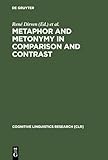Metaphor and Metonymy in Comparison and Contrast / ed. by René Dirven, Ralf Pörings.
Material type: TextSeries: Cognitive Linguistics Research [CLR] ; 20Publisher: Berlin ; Boston : De Gruyter Mouton, [2009]Copyright date: ©2002Edition: Reprint 2014Description: 1 online resource (605 p.)Content type:
TextSeries: Cognitive Linguistics Research [CLR] ; 20Publisher: Berlin ; Boston : De Gruyter Mouton, [2009]Copyright date: ©2002Edition: Reprint 2014Description: 1 online resource (605 p.)Content type: - 9783110173734
- 9783110219197
- 401/.43 22
- P301.5.M48 M463 2002eb
- online - DeGruyter
- Issued also in print.
| Item type | Current library | Call number | URL | Status | Notes | Barcode | |
|---|---|---|---|---|---|---|---|
 eBook
eBook
|
Biblioteca "Angelicum" Pont. Univ. S.Tommaso d'Aquino Nuvola online | online - DeGruyter (Browse shelf(Opens below)) | Online access | Not for loan (Accesso limitato) | Accesso per gli utenti autorizzati / Access for authorized users | (dgr)9783110219197 |
Frontmatter -- Contents -- Introduction -- Section 1: The metonymic and the metaphoric -- The metaphoric and metonymic poles -- Generating polysemy: Metaphor and metonymy -- Metonymy and metaphor: Different mental strategies of conceptualisation -- An alternative account of the interpretation of referential metonymy and metaphor -- Section 2: The two-domain approach -- Language and emotion: The interplay of conceptualisation with physiology and culture -- The role of domains in the interpretation of metaphors and metonymies -- Clarifying and applying the notions of metaphor and metonymy within cognitive linguistics: An update -- The roles of metaphor and metonymy in English -er nominals -- Section 3: The interaction between metaphor and metonymy -- Category extension by metonymy and metaphor -- Metaphtonymy: The interaction of metaphor and metonymy in expressions for linguistic actIon -- When is a metonymy no longer a metonymy? -- How metonymic are metaphors? -- The interaction of metaphor and metonymy in composite expressions -- Section 4: New breakthroughs: Blending and primary scenes -- Metaphor, metonymy, and binding -- Patterns of conceptual interaction -- Converging evidence for the notions of subscene and primary scene -- Blending the past and the present: Conceptual and linguistic integration, 1800-2000 -- Backmatter
restricted access online access with authorization star
http://purl.org/coar/access_right/c_16ec
The book elaborates one of Roman Jakobson's many brilliant ideas, i.e. his insight that the two cognitive strategies of the metaphoric and the metonymic are the end-points on a continuum of conceptualization processes. This elaboration is achieved on the background of Lakoff and Johnson's twodomain approach, i.e. the mapping of a source onto a target domain of conceptualization. Further approaches dwell on different stretches of this metaphor-metonymy continuum. Still other papers probe into the specialized conceptual division of labor associated with both modes of thought. Two new breakthroughs in the cognitive linguistics approach to metaphor and metonymy have recently been developed: one is the three-domain approach, which concentrates on the new blends that become possible after the integration or the blending of source and target domain elements; the other is the approach in terms of primary scenes and subscenes which often determine the way source and target domains interact.
Issued also in print.
Mode of access: Internet via World Wide Web.
In English.
Description based on online resource; title from PDF title page (publisher's Web site, viewed 28. Feb 2023)


